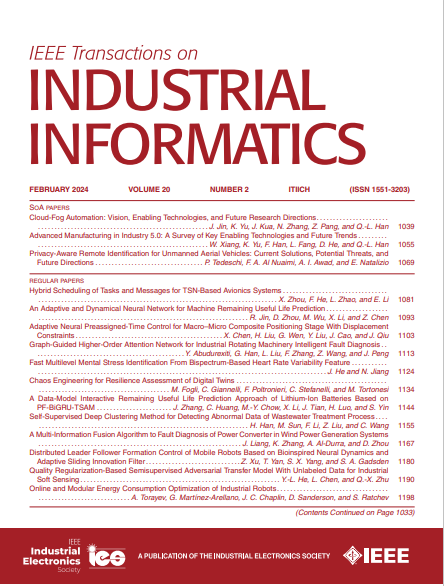Enhanced Protection Algorithm for Zonal DC Microgrids
IF 9.9
1区 计算机科学
Q1 AUTOMATION & CONTROL SYSTEMS
引用次数: 0
Abstract
Conventional protection methods are constrained for effectively identifying and classifying faults within dc microgrid setups because of the integration of diverse power electronic-based generators and dc loads. For dc microgrids configured in zonal topology with bidirectional power flow, designing effective protection becomes even more complex. Ensuring reliable power supply to consumers while preventing the unnecessary disconnection of renewable resources underscores the importance of selectivity in protection schemes. Addressing this challenge requires advanced, intelligent fault detection schemes. This article proposes a high-speed fault identification algorithm built upon the current derivative signals at both line terminals. Upon fault detection, the type of fault is determined by the current derivative characteristics on the positive and negative poles of either side of a line. MATLAB/Simulink simulations of a zonal dc microgrid with various generating units and loads validate the developed algorithm, considering a range of fault conditions, including internal, external, high-resistance, and noisy conditions. Simulation results demonstrate the ability of the technique to segregate internal and external faults and accurately classify them. Furthermore, the suggested scheme is evaluated on a hardware testbed, confirming its efficacy in real-world dc microgrid applications.区域直流微电网的改进保护算法
由于各种电力电子发电机和直流负载的集成,传统的保护方法在有效识别和分类直流微电网故障方面受到限制。对于具有双向潮流的带状拓扑结构的直流微电网,设计有效的保护变得更加复杂。确保向消费者提供可靠的电力供应,同时防止不必要的可再生资源中断,强调了保护方案中选择性的重要性。解决这一挑战需要先进的智能故障检测方案。本文提出了一种基于线路两端电流导数信号的高速故障识别算法。在进行故障检测时,根据线路两侧正负极上的电流导数特征来确定故障类型。用MATLAB/Simulink对具有不同发电机组和负载的区域直流微电网进行了仿真,验证了所开发的算法,并考虑了一系列故障条件,包括内部、外部、高阻和噪声条件。仿真结果表明,该方法能够有效地分离内部故障和外部故障,并对其进行准确分类。在硬件测试平台上对该方案进行了评估,验证了其在实际直流微电网应用中的有效性。
本文章由计算机程序翻译,如有差异,请以英文原文为准。
求助全文
约1分钟内获得全文
求助全文
来源期刊

IEEE Transactions on Industrial Informatics
工程技术-工程:工业
CiteScore
24.10
自引率
8.90%
发文量
1202
审稿时长
5.1 months
期刊介绍:
The IEEE Transactions on Industrial Informatics is a multidisciplinary journal dedicated to publishing technical papers that connect theory with practical applications of informatics in industrial settings. It focuses on the utilization of information in intelligent, distributed, and agile industrial automation and control systems. The scope includes topics such as knowledge-based and AI-enhanced automation, intelligent computer control systems, flexible and collaborative manufacturing, industrial informatics in software-defined vehicles and robotics, computer vision, industrial cyber-physical and industrial IoT systems, real-time and networked embedded systems, security in industrial processes, industrial communications, systems interoperability, and human-machine interaction.
 求助内容:
求助内容: 应助结果提醒方式:
应助结果提醒方式:


